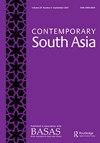肮脏政治与地方政治中的政治关怀:印度德拉敦道德边界跨越的性别障碍
IF 0.8
3区 社会学
Q3 AREA STUDIES
引用次数: 0
摘要
“政治是肮脏的”是老生常谈,在世界很多地方,尤其是在印度,这是理所当然的现实。它的影响同样被认为是不可避免的。研究女性政治代表性不足的学者经常指出,民主政治的“肮脏”本质是阻碍女性参与政治的关键因素。虽然我不否认政治在某些方面是“肮脏的”,但我质疑政治阻碍女性政治代表的机制。根据对印度北部德拉敦(Dehradun)女性政党工作人员和当选市政议员的人种学研究,我分析了“肮脏政治”如何将女性置于政治领域“格格不入”的位置。虽然男性和女性都参与政治关怀的行为,但男性更容易跨越他们之间的界限,跨越“肮脏的政治”和“关心的政治”。这种将“政治”作为一个不适合女性或与其活动不匹配的领域的生产,是导致南亚及其他地区女性在政治中代表性不足的一个因素。本文章由计算机程序翻译,如有差异,请以英文原文为准。
Dirty politics and political care in local politics: gendered barriers to moral boundary crossing in Dehradun, India
ABSTRACT ‘Politics is dirty’ is a truism, a taken-for-granted reality in much of the world, particularly in India. Its implications are likewise seen as inescapable. Scholarship examining women’s political underrepresentation often cites the ‘dirty’ nature of democratic politics as a key disincentive for women to participate. While not disputing that politics is, in some respects, ‘dirty’, I question the mechanisms through which it is said to hinder women’s political representation. Drawing upon ethnographic research with female party workers and elected municipal councillors in Dehradun, North India, I analyse how ‘dirty politics’ positions women as ‘out of place’ within the political realm. While both men and women engage in acts of political care, men can more easily transgress the boundaries between them, straddling both ‘dirty politics’ and a ‘politics of care’. This production of the ‘political’ as a realm unsuitable for women or mismatched with their activities, is one factor contributing to the underrepresentation of women in politics in South Asia, and beyond.
求助全文
通过发布文献求助,成功后即可免费获取论文全文。
去求助
来源期刊

Contemporary South Asia
AREA STUDIES-
CiteScore
2.10
自引率
0.00%
发文量
82
期刊介绍:
The countries of South Asia - Bangladesh, Bhutan, India, Maldives, Nepal, Pakistan and Sri Lanka - are internally diverse and part of global flows of people, goods and ideas. Contemporary South Asia seeks to address the issues of the region by presenting research and analysis which is both cross-regional and multi-disciplinary. The journal encourages the development of new perspectives on the study of South Asia from across the arts and social sciences disciplines. We also welcome contributions to pan-regional and inter-disciplinary analysis. Our aim is to create a vibrant research space to explore the multidimensional issues of concern to scholars working on South Asia and South Asian diasporas in the postcolonial era.
 求助内容:
求助内容: 应助结果提醒方式:
应助结果提醒方式:


